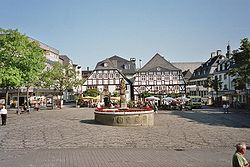Thülen
| Brilon | ||
|---|---|---|

Marketplace in Brilon
|
||
|
||
| Coordinates: 51°23′0″N 08°34′0″E / 51.38333°N 8.56667°ECoordinates: 51°23′0″N 08°34′0″E / 51.38333°N 8.56667°E | ||
| Country | Germany | |
| State | North Rhine-Westphalia | |
| Admin. region | Arnsberg | |
| District | Hochsauerland | |
| Government | ||
| • Mayor | Dr. Christoph Bartsch (SPD) | |
| Area | ||
| • Total | 228.95 km2 (88.40 sq mi) | |
| Elevation | 450 m (1,480 ft) | |
| Population (2015-12-31) | ||
| • Total | 26,232 | |
| • Density | 110/km2 (300/sq mi) | |
| Time zone | CET/CEST (UTC+1/+2) | |
| Postal codes | 59914-59929 | |
| Dialling codes | 02961 (Brilon) 02963 (Messinghausen) 02964 (Alme) 02991 (Marsberg-Bredelar) | |
| Vehicle registration | HSK | |
| Website | www.brilon.de | |
Brilon (German pronunciation: [ˈbʁiːlɔn]) is a town in North Rhine-Westphalia, Germany, that belongs to the Hochsauerlandkreis.
Brilon is situated on the Brilon Heights at an altitude of about 450 m on the upper reaches of the river Möhne. The town lies between the Arnsberg Forest nature reserve to the west and the Lake Diemel nature reserve and the Hoppecke to the south-east.
After the local government reforms of 1975 Brilon consists of 17 districts:
(Source of population figures: www.briloner-wirtschaft.de / As at: 31 December 2004)
The first documentary reference occurs in a deed of the Emperor Otto II dated 973, confirming to the Cathedral of Magdeburg all those possessions in Westphalia given to it by his father, including the Villa Brilon. This reference must of course apply to a considerably older settlement than the present town, presumably what is now Altenbrilon. The Brilon estate passed later by exchange to the Archbishops of Paderborn, who endowed their steward ("Vogt") with it.
In about 1220 Archbishop Engelbert I of Cologne acquired the Brilon lands of the brothers Hermann and Gernand of Brilon. The Archbishop laid out a fortified town and gave it municipal rights. Bloody conflicts followed between the Archbishops of Cologne and the Bishops of Paderborn over the rights of possession of the place. These ended when the Bishop of Paderborn, after being taken prisoner, waived his rights to Brilon (1256).
...
Wikipedia




